
Alameda County Superior Court
Preliminary Injunction Hearing for
Berkeley Memorial Oak Grove Protesters
Alameda County Superior Court - Preliminary Injunction Hearing October 1, 2007 Alameda County Superior Court Judge Richard Keller issued a preliminary injunction evicting protesters from a grove of oak trees near a football. The judge barred the protesters from "lodging in, scaling, climbing or hanging or sitting or standing" in tree-houses, hammocks or platforms in the grove, according to the order. University officials asked for the injunction because of what they described as rapidly increasing safety and sanitation problems at the grove. The judge sided with the university, saying the regents' right to protect university property trumps the protesters' right of free speech. On October 29, 2007, Judge Keller extended his ruling to apply to "all other persons acting in concert or participating with (the protesters)". Attorneys Dennis Cunningham, William Simpich represented the Protesters and, attorney Michael Goldstein preresented the University of California Regents Note: The DVD video recording addressed by Protester's legal council and the judge were produced by Berkeley Citizen. This media was offered in the support of the tree-sit and to daylight the "clean hands" involvement of the UC Police at the Memorial Oak Grove. Produced by Berkeley Citizen |
 |
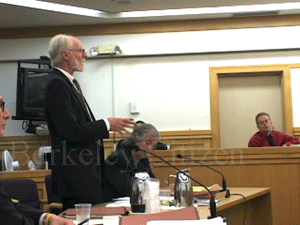 |
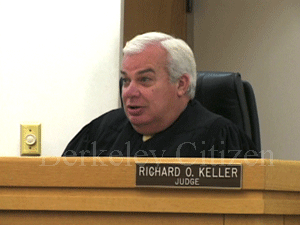 |
| Attorney Michael Goldstein Legal Council for the UC Regents |
Civil Rights Attorney Dennis Cunningham speaking for the protesters | Judge Richard O. Keller Alameda County Superior Court |
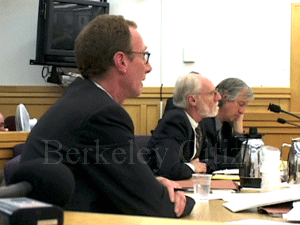 |
 |
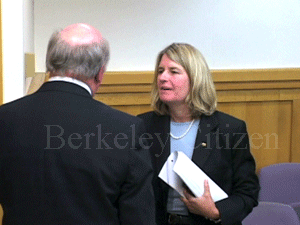 |
Court proceeding regarding Preliminary |
Protest leader Zachary Running Wolf conferring with Legal Council |
UC Berkeley Police Chief Victoria Harrison |
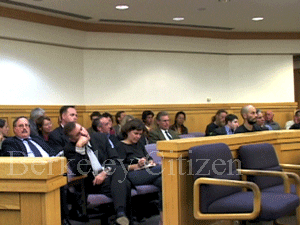 |
 |
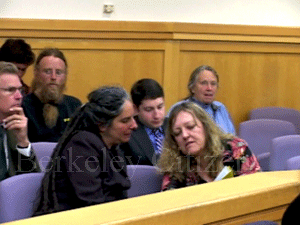 |
| Alameda County Court visitor gallery | UCB Operations Detective Wade McAdams | Berkeley Oak Grove community support |
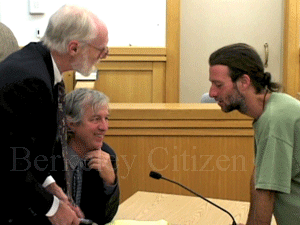 |
 |
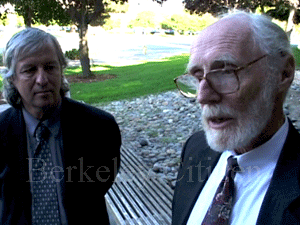 |
| Council with free speech protester's ground support, Ayr |
Dan Mogulof, Executive Director UC Berkeley Public Affairs |
Attorneys Dennis Cunningham & William Simpich |
San Francisco Chronicle Berkeley's tree-sitters must climb down from their roosts or face five days in jail and a $1,000 fine apiece, an Alameda County judge ruled Monday. Superior Court Judge Richard Keller granted UC Berkeley a preliminary injunction against the protesters, who have been perched in an oak grove near Memorial Stadium since December hoping to stop the university's plan to build a sports facility there. The judge barred the protesters from "lodging in, scaling, climbing or hanging or sitting or standing" in tree-houses, hammocks or platforms in the grove, according to the order. University officials asked for the injunction because of what they described as rapidly increasing safety and sanitation problems at the grove. UC police have issued almost 200 citations for trespassing, assault and other infractions, and some officers have complained of being hit with feces and urine from the tree houses. Several of the tree houses also have propane tanks for cooking. "They're saying we're endangering the trees when they're planning to chop them down," he said. "It's a big joke." In another Alameda County Superior Court room, hearings continue over the fate of the $125 million athletic training facility the university wants to build in a portion of the grove site. Judge Barbara Miller will decide if the facility would violate the Alquist-Priolo Act, a state law that bans new buildings on earthquake faults. The City of Berkeley, a neighborhood group and the tree-sitters sued to stop the project, claiming the site is too dangerous because it's traversed by the Hayward Fault. Testimony in the case resumes today, and closing arguments are expected next week. Miller has 90 days to issue a ruling. One hiccup in the university's request for an injunction is that it names only one of the half-dozen or so protesters who dwell in the trees, 36-year-old David Galloway, who goes by the name "Elm." Many of the others wear masks and do not give their real names. Galloway, reached outside the recently erected grove fence, said he intends to abide by the stay-away order because he has an injured arm and does not want to go to jail and pay a fine. Galloway said he ripped cartilage in his arm trying to run up a tree to escape a campus police officer recently. He said he's been in the trees off and on since January. He acknowledged that he has used a propane stove to cook food and to "treat people's wounds" but denied posing a danger to anyone. "Now I'm ordered out of the tree," Galloway said, wearing a blue bandanna to cover his face. "I imagine if I go back into the tree, I go to jail.""They're saying we're endangering the trees when they're planning to chop them down," he said. "It's a big joke." |
Berkeley Citizen © 2003
All Rights Reserved
All Rights Reserved